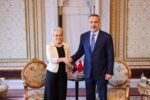On Thursday, NATO Secretary General Mark Rutte issued a stark warning about Russian President Vladimir Putin’s ambitions, stating that Putin aims to “wipe Ukraine off the map” and may turn his attention to other parts of Europe afterward. In light of this threat, Rutte urged Europeans to pressure their governments to increase defense spending.
Rutte’s remarks, delivered at the Carnegie Europe organization in Brussels, were clear: “The time has come for a war-time mindset,” as he called on nations to prepare for potential Russian aggression using “swarm drones,” similar to their deadly impact in Ukraine.
Putin, he stated, is attempting to dismantle “our freedom and way of life.” He emphasized the continued threat posed by Russia, referencing earlier invasions, such as Russia’s 2008 assault on Georgia, the 2014 annexation of Crimea, and the full-scale invasion of Ukraine nearly three years ago.
Rutte also cautioned that Russia is preparing for a prolonged confrontation, both with Ukraine and with NATO allies, stressing that Europe must be prepared for potential future conflicts. Despite NATO’s ongoing support for Ukraine, including weapons and aid, the return of Donald Trump, with promises to end the war quickly, has raised concerns about a potentially unfavorable ceasefire being imposed on Ukraine.
He also noted that Russia’s military spending is expected to reach 7-8% of its GDP next year, which is significantly higher than NATO members’ defense budgets. Russia enjoys support from allies such as China, Iran, and North Korea.
Rutte recognized that defense spending in Europe has increased, with 23 NATO countries expected to meet the NATO target of dedicating 2% of their GDP to defense. However, he warned that this may not be enough. “We will need much more than 2%,” he said.
Rutte also detailed a series of hostile actions by Russia against NATO allies, including cyberattacks, assassinations, a munition depot explosion in the Czech Republic, blocking radar in the Baltic region to disrupt air traffic, and arming migrants to destabilize Europe.
These attacks, he argued, are not isolated incidents but part of a coordinated effort to destabilize societies and undermine support for Ukraine. Rutte emphasized that, despite NATO’s current readiness, the future remains uncertain.
He called on governments to secure large and long-term contracts for defense industries to rapidly produce more advanced weapons, especially to counter new threats like drones. “Freedom does not come for free,” he reminded the audience, urging continued vigilance against the growing risk to Europe’s security.







